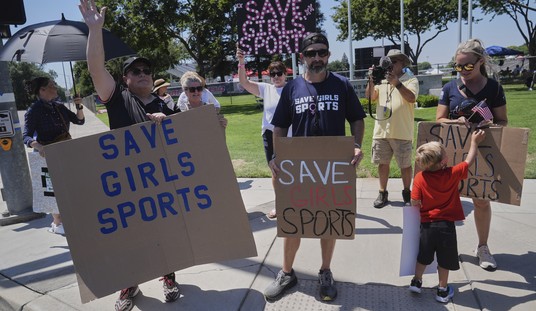While Mitt Romney has been the model of polling stability in the run-up to the Republican presidential primary, his main competitors have followed a very different trajectory. Each of the emerging co-frontrunners has enjoyed a parabolic rise to the top of national and state polls, only to descend quickly after getting the kind of close scrutiny that comes with the pole position. Has the same begun to happen to Newt Gingrich? The latest Gallup survey shows that Gingrich has dropped six points in a week, although still leading nationally:
Newt Gingrich continues to lead the field of candidates for the Republican nomination, though his lead over Mitt Romney has shrunk slightly from last week. Currently, 31% of Republican registered voters nationwide say they are most likely to support Gingrich for the nomination, compared with 22% choosing Romney, with all other candidates in single digits. …
Since Gallup began Daily tracking of national Republican nomination preferences last week, Gingrich has averaged a 12-point advantage over Romney, with a high of 15 points in Gallup’s initial report based on Dec. 1-5 interviewing. The current 9-point tracking lead for Gingrich is the smallest yet for the former speaker of the House.
Gingrich has come under increasing attack from his rivals in debates, on the campaign trail, and in television ads since he became the front-runner this month, which may be chipping away at his support, now at 31% after being 37% in the initial tracking report.
At the same time, Romney’s support has been fairly stable over this time. In fact, the decline in Gingrich’s support has not been offset by an increase in another candidate’s support; instead, there has been an increase in the “undecided/no opinion” category, which is up five percentage points in the past week.
The follows the dynamic we have often seen in this race. One candidate gets hot and bounds up the polls, and then either commits a gaffe or voters take a serious look at the record and start getting qualms. Gingrich hasn’t committed the kind of gaffe that would produce a polling shock, and he just came off of a good debate performance, while Romney didn’t do so well. Romney’s support hasn’t changed from last week’s 22%, though. This looks like second-blush re-evaluation.
Another reason this may be the case is that the support didn’t benefit anyone else. Those six points ended up mainly in the “no opinion” option, which rose from 14% to 19%. In the next three positions below Romney, the candidates all maintained the exact same percentage of support.
A drop from 37% to 31% isn’t exactly a crisis, however, for a frontrunner who is still nine points ahead of his nearest rival, and the re-evaluation may not damage Gingrich as much as people might think. Josh Kraushaar writes that being a big thinker with a lot of big ideas — some of them pretty far out — has its advantages, especially when the candidate can point to big accomplishments, and compares Gingrich to Steve Jobs:
Like Jobs, Newt Gingrich is a big thinker. He provided the intellectual groundwork to fuel the House takeover in 1994 after 40 years in the wilderness. He championed welfare reform and a balanced budget. But like Jobs, Gingrich’s lack of discipline caused chaos within the GOP conferences. Like Jobs, he saw allies turn on him.
And now Gingrich, after spending just over a decade in the political wilderness, is looking for a second act—like Jobs did, when he returned to run Apple 10 years after his ignominious ouster.
Gingrich likes to compare himself to Winston Churchill, whose political fortunes followed the same pattern, but I’m pretty sure he won’t mind the comparison to the late Jobs. Kraushaar then explains why Gingrich can’t be underestimated:
There’s no doubt Gingrich would be a risky nominee. Obama is exceptionally vulnerable, and the most prudent pick would be a safe candidate who could make the election entirely about the president’s economic record. Gingrich is anything but safe, whether it’s his multiple marriages, his record as the only speaker ever sanctioned by the House, his self-centered disposition, or his sacrificing of conservative principle for profit in his post-congressional career. The list goes on.
But it’s also clear that he brings an intriguing upside to the presidential equation. He’s not afraid to mount a full frontal assault against Obama’s policies. The president’s health care plan is as unpopular as it has ever been, the economic stimulus law hasn’t achieved its goals and, he’s struggled to accomplish meaningful deficit-reduction or entitlement reform. A new Gallup Poll shows Americans fear big government much more than big business, by a substantial 64 percent to 26 percent. That would favor a nominee like Gingrich, who would aggressively paint the president as a big-spending liberal.
Gingrich’s positive assets include his ability to tout the conservative accomplishments of working with Bill Clinton to pass welfare reform and balanced budgets—an ironic twist, given the nasty, partisan fights between the two during the 1990s. But if Obama points to Gingrich as “the godfather of gridlock,” as his reelection team is hinting, Gingrich would be well-positioned to apportion blame right back at the president, contrasting his accomplishments with Clinton to the president’s lack of a relationship with current House Speaker John Boehner.
On the other hand, John Ziegler sees disaster ahead, and has a bet for anyone who thinks Gingrich can beat Barack Obama:
Make no mistake; the evidence is overwhelming that Gingrich would not only lose to Obama, but that he would likely get crushed.
The primary reason for this is that there is no way for him to win the battle for the wide swath of independent voters who don’t pay much attention to politics and who are most influenced only by the headlines that are easily understood. Unfortunately, these are the same voters who usually decide who wins our modern presidential elections.
There are several layers to this argument with regard to Newt, so we will deal with them in order of how obvious they are.
First off, Newt Gingrich is a fat, old, angry, white male named Newt who is perceived (wrongly) as a far right conservative. Right there he is nearly unelectable, but since Obama is so vulnerable (though not nearly as much a many grassroots conservatives believe) if that was the extent of his baggage he could still pull off a victory.
Unfortunately, this is not nearly the case.
I’m of the opinion that any mainstream Republican candidate has a good chance of beating Obama in November, and Gingrich is the kind of fighter that won’t allow the media to dictate the terms of the debate — but that’s true of other candidates in the race, too, and there is a legitimate concern over Gingrich’s discipline on ideas and campaigning. It’s those concerns that may have his supporters rechecking their assumptions. It’s not a downward slide of the parabola yet, but a dip in enthusiasm isn’t the kind of development a campaign wants to see at this precise moment.








Join the conversation as a VIP Member